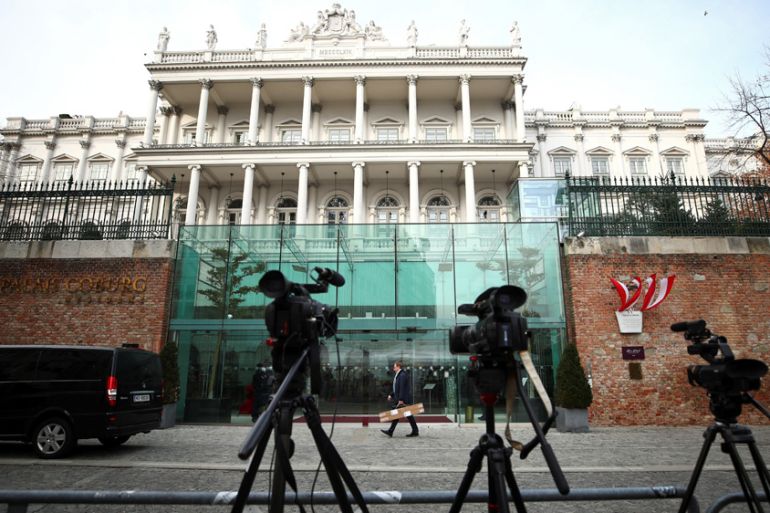Iran and world powers resume Vienna talks to restore nuclear deal
Russia’s representative says talks begin ‘quite successfully’ as Iran’s negotiator says Tehran is serious about reaching a ‘fair agreement’.

Tehran, Iran – Iran and the world powers party to its 2015 nuclear deal have begun long-awaited talks in Vienna to restore the pact, which the United States abandoned three years ago.
Representatives of Iran, China, France, Germany, Russia, and the United Kingdom convened in the Austrian capital on Monday. Messages were relayed to American representatives as Iran again refused to hold direct talks since the US is no longer a member of the accord.
Keep reading
list of 4 itemsIsrael signals readiness to escalate Iran confrontation
US must ‘accept reality’ and lift sanctions: Iran negotiator
Iran’s IRGC seizes foreign tanker for smuggling diesel
After the first meeting, the European Union’s Enrique Mora, who is chairing the talks, sounded optimistic.
“I feel positive that we can be doing important things for the next weeks,” he told reporters.
Mora said that a sanctions working group that was formed during a previous round of talks in April will restart its activities from Tuesday, and the nuclear working group will reactivate a day later.
Mora also said Iran has accepted the need to build on results achieved during the first six rounds of talks, adding that Tehran also wishes to incorporate the new “political sensibilities” of the Raisi administration.
In a statement following the talks, the Iranian foreign ministry said that Iran’s top negotiator Ali Bagheri Kani emphasised to the participants that Iran is serious about reaching a “fair agreement” that would secure Iran’s legitimate interests.
“So long as the US’ maximum pressure campaign breathes, reviving the JCPOA is nothing more than exorbitant talk,” the negotiator was quoted as saying.
The meeting of the Joint Commission on #JCPOA is over. The participants agreed on further immediate steps during the seventh round of negotiations which started quite successfully. pic.twitter.com/qZyqpaiqFw
— Mikhail Ulyanov (@Amb_Ulyanov) November 29, 2021
Russia’s top negotiator, Mikhail Ulyanov, confirmed in a tweet that participants agreed on further immediate steps during the seventh round of talks, which he said “started quite successfully”.
The talks are a continuation of six rounds of talks that paused in June to allow Iran’s President Ebrahim Raisi to form his administration.
Several informal meetings, including a trilateral meeting between Iran, China and Russia, and another between Kani and the EU’s Mora, were held on Sunday to set up the main negotiations.
If successful, the talks will lift unilateral US sanctions while scaling back Iran’s nuclear programme. But differences in the two countries’ stances heading into the discussions cast doubt on the odds of success, and were expected to prolong the talks.
US must ‘accept reality’
Iran has said the US must accept responsibility for reneging on the accord, verifiably lift all sanctions imposed since 2018 at once, and guarantee it will not go back on its commitments again.
Iran’s negotiating team in Vienna mostly consists of people with economic expertise, signalling the country’s main focus in the talks will be on lifting the crippling American sanctions.
The US, meanwhile, has said it is ready to lift sanctions that are “inconsistent” with the Joint Comprehensive Plan of Action (JCPOA), as the deal is formally known. This means the Biden administration wants to maintain some of the human rights and “terrorism” sanctions it has imposed, as well as those imposed by the Trump administration.
Later on Monday, a US State Department spokesperson reiterated Washington’s call for a return to mutual compliance with the deal, without sharing details about the resumption of the talks. “If Iran demands more or offers less than a mutual return to compliance, these negotiations will not succeed,” Jalina Porter told reporters during a phone briefing.
Both sides had repeatedly questioned each other’s commitment ahead of the talks. Iran’s Bagheri told Al Jazeera last week the US must “accept reality” and come to Vienna with the intent of lifting all sanctions.
Iran’s foreign ministry spokesman, Saeed Khatibzadeh, on Monday accused the JCPOA’s European signatories of attempting to delay the lifting of sanctions.
This came in reaction to a joint article by the foreign ministers of the UK and Israel – the nuclear deal’s most vocal opponent – in which the two pledged to prevent Iran from obtaining a nuclear weapon.
Israeli Foreign Minister Yair Lapid will on Tuesday visit France to meet President Emanuel Macron after attending an event with British Prime Minister Boris Johnson on Monday. Israel has previously threatened Iran with direct military action.
Iran maintains it is not seeking a nuclear weapon, but Western powers question the expansion of the country’s nuclear programme during the past two years, which has seen it enrich uranium up to 60 percent and deploy advanced centrifuges.
Meanwhile, other regional players such as members of the Gulf Cooperation Council (GCC) have welcomed the restoration of the nuclear deal, whereas they – led by Iran’s major rival, Saudi Arabia – previously supported Trump’s “maximum pressure” campaign against Iran.